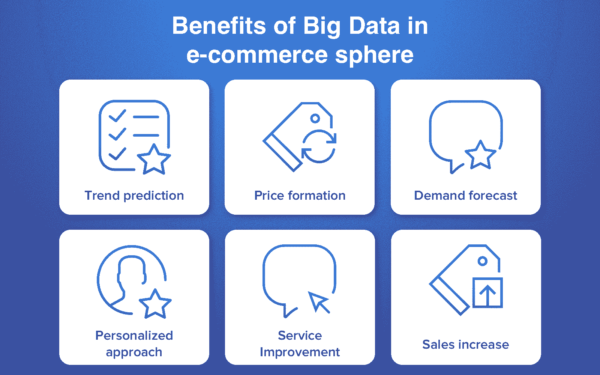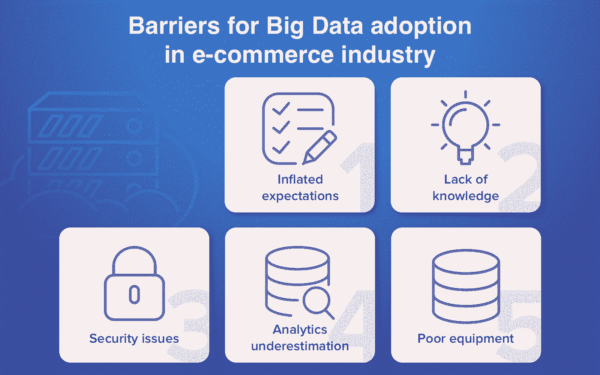Big data analytics is a valuable instrument which solves multiple business problems and provides a variety of potential advantages. But big data also has many potential drawbacks.
E-commerce is developing rapidly. Online selling and buying have become very ordinary things. Every day, people make thousands of purchases on the internet—paying for various goods and services. All these activities produce a large bulk of data. If properly processed and analyzed, it can provide valuable insight into the e-commerce sphere and raise business performance. Let’s dig a little deeper into the subject and find out the benefits of big data in e-commerce, its drawbacks, and the most reliable vendors of big data analytics.
The advantages of big data in e-commerce
Big data analytics tools were created to increase the business capabilities. They give businesses the tools they need to extract valuable and relevant insights from seemingly random information. Let’s start by looking at some of the primary benefits of big data.

Forecasting trends
Various systems built on the basis of big data algorithms collect information from browsers and social networks and determine the most popular trends. You can track products that are in demand, analyze customer ratings and reviews, and understand sentiment and how your business is perceived on the local or global market. It helps you get to know your clients better, find out what they’re interested in, and meet their requirements.
Reviewing the ad data and factors dynamics, you can determine trends that are growing and predict commercial opportunities. This contributes to building a suitable business strategy and increasing the number of satisfied customers.
Demand projection
If you are going to sell a product, you need to clearly understand when it will be in demand. Keeping it in a warehouse for a long time is completely pointless, since you will bear the storage costs.
Demand is often irregular. In different periods of time, it can grow or decrease. Some goods can find a quick sale in particular times, for example, holidays, festivals, football matches, etc.
E-commerce big data tools take into account all possible factors. They analyze the situation from every possible angle and offer the most appropriate time and conditions to sell the product.
Customized approach
The trend for businesses of all sizes is to deliver a unique, custom experience for each individual. When a client sees that you are not just trying to sell something, but really care about their needs, he or she grows a positive opinion about your company and spends money willingly.
Online shopping is no exception. Big data analytics enable you to leverage data from the customer’s browser search history to tailor the experience and help the individual find items they’re likely to want. Using big data analytics, you can fill your shop with goods that will be in demand. Also, you can offer the relevant products when a user looks through the goods catalog.
High-quality service
Today’s users have a short attention span. They will not wait around long for you to offer the product they’re looking for or fix issues with the site. They will simply forget about you and find another seller.
Providing great service is a must and with big data tools you can be largely successful in it. Collecting the users’ info in social media, you can learn their lifestyle and provide exceptional service based on their preferences.
Sales growth
To develop a business, you need to increase sales constantly. Big data technology can serve you well in this matter. For example, you can analyze the factors influencing the decision not to make a purchase when the goods are already added to the shopping cart.
According to the latest studies, users call off about 70 percent of the shopping carts and cancel the purchase at that point. Big data tools may help you reveal the reasons.
The issues of using Big Data tools
It’s not all rainbows and butterflies. Along with the insights and benefits that can be gained with big data analytics, you also get a healthy dose of potential issues and concerns. When you decide to use big data analytics, you should pay attention to a number of factors that may affect the value you get.

Wrong expectations
No matter how good technologies are, they cannot completely replace a human being. With the help of big data, you can collect, organize, and analyze information. However, this does not guarantee the success of your business. Important decisions still need to be made by human beings—informed with information extracted from big data analytics.
Lack of knowledge
In order to effectively leverage big data, you need to learn how to work with big data applications, ask the right questions, and process information using big data analytics.
Keep in mind that the machine runs on a variety of templates. It does not always understand what data should be considered or ignored. Big data analytics are only as good as the data that is fed into the system, and extracting valuable insights requires an understanding of the data being analyzed and the broader context.
Security issues
This is the most sensitive issue that arises when using big data. In fact, you will have access to personal information about users, including credentials and other private details. You need to consider how to protect this data and ensure the complete safety of customers—especially now that the GDPR has gone into effect.
Poor analytics
Many entrepreneurs set a goal to collect large amounts of data, not understanding that this is only the first stage in obtaining truly comprehensive information. Tons of data alone are not of value. What you really need is to invest in analytical tools that will help you rework the acquired information and guide the right business decisions based on relevant factors.
Low-tech equipment
To collect and process such huge amounts of information you need powerful equipment. Both hardware and software matter. Fortunately, current big data analytics vendors can provide everything necessary.
It’s crucial to properly deploy and configure big data analytics tools. Unless you’re a big data expert yourself, it’s probably better to hire professionals to help out with this. However, the maintenance of tools will be completely on your shoulders (unless you contract a service provider of some sort).
Big data in e-commerce is a powerful way to identify weak and strong business factors, predict market trends, and analyze the overall economic situation. By investing in this area, you build a highly competent business strategy. The implementation does not always go smoothly. Nevertheless, the investment in time, money and effort is more than recouped once it’s running smoothly.




I like what you said about how it’s a trend for businesses of any and all sizes to deliver a unique, custom experience for each individual. My cousin is revamping his business to use analytics to help deliver such an experience and wants to make sure he can prove how much he cares about his clients. Thank you for the information about big data analytics enable you to leverage data from the customer’s browser search history to tailor the experience and help them find items they are likely to want.